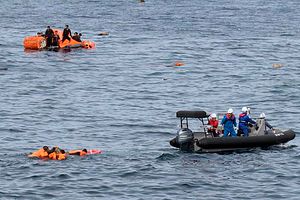Approximately 60 North Korean fishermen have been rescued by Japan after a collision between their fishing trawler and a Japanese patrol vessel in the Sea of Japan on Monday morning, Japan’s public broader NHK reported.
According to the Japan Coast Guard, the collision incident took place at around 9:10 a.m. in Japan’s exclusive economic zone. The location of the incident was approximately 220 miles off Japan’s Noto Peninsula.
Following the collision, the North Korean vessel sank. According to Satoshi Kuwahara, an official for Japan’s Fisheries Agency, the North Korean fishermen were illegally operating within Japan’s exclusive economic zone.
According to the United Nations Convention on the Law of the Sea, coastal states have the exclusive right to exploit economic resources—including fisheries—in a 200 nautical mile zone off their coastlines. The location of the collision and the sinking incident is reportedly an area rich in squid.
According to Japanese authorities, none of the North Korean fishermen were seriously injured and had been taken to shore.
Though North Korean fishermen continue to operate in the exclusive economic zones of nearby states, including Japan and Russia, United Nations Security Council sanctions largely bar North Korea’s exports of seafood.
Paragraph 9 of UNSC resolution 2371 bars North Korea from selling or transferring “seafood (including fish, crustaceans, mollusks, and other aquatic invertebrates in all forms).” Parts of the country’s fishing industry are thought to have links to the Korean People’s Navy and thus seafood exports represent a source of income for military purposes.
The collision incident with Japan comes as North Korea has continued to criticize Tokyo, which emerged as its main target for public criticism following the commencement of diplomacy with South Korea and the United States in early 2018.
At the end of September 2018, multiple articles in North Korean state media criticized Japan for pursuing the deployment of Aegis Ashore, a land-based missile defense system designed to intercept ballistic missiles high above the earth’s atmosphere.
In September, more than one hundred North Korean sailors had been arrested by Russian authorities for illegal fishing operations in Russian waters. During one incident, a North Korean fishing crew attacked Russian authorities, resulting in a violent altercation that caused injuries on both sides.
“We have demanded that the North Korean side take comprehensive measures with the aim to avoid such incidents in the future,” the Russian Ministry of Foreign Affairs noted in a statement.
The incident came at a time of rapprochement in Russia-North Korea relations.

































